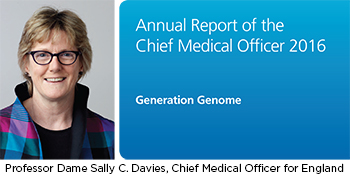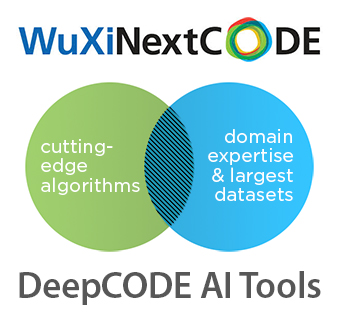
Whatever path various societies take to tap the power of the genome to improve human health, a recent report from England’s Chief Medical Officer, Dame Sally Davies, calls out key elements for realizing that future sooner rather than later.
England’s Chief Medical Officer wants to build on the success of Genomics England’s 100,000 Genomes Project and take her country swiftly into the age of precision medicine. The goal is to get patients optimal treatment more quickly and with fewer side effects. That means using genomics to more accurately guide prescribing—initially for cancer, infections, and rare diseases—but increasingly for all conditions and overall wellness and prevention.
Dame Sally Davies’ vision is anchored in the work that Genomics England is engaged in today and to which WuXi NextCODE and other leading genomics organizations have contributed. It’s a rallying cry that many voices are joining and underpins our work not only in England, but also similar efforts we are helping to advance in countries near and far, from Ireland to Singapore.
Her call is particularly forceful in three areas that she rightly singles out as critical to realizing the potential of precision medicine to revolutionize healthcare:
- Industrial scale: Genomics has in many ways been treated and developed as a “cottage industry,” yielding important advances. But the need is massive scale in the era of population health (e.g., whole-genome sequencing, or WGS).
- Privacy AND data sharing: Dame Sally wants to provide and ensure high standards of privacy protection for genomic data but is adamant that this should not come at the price of stifling the data sharing and large-scale collaboration that will transform medical care and many patients’ lives. She wants to move beyond “genetic exceptionalism,” which holds that genomic data is fundamentally different or more valuable than other data. Like other sensitive data, we can protect genomic data well and use it for public benefit.
- Public engagement: She calls for a new “social contract” in which we, as individuals and members of society, recognize that all of us will benefit if we allow data about our genomes to be studied. That holds whether we are talking within our own countries or globally.
In England, as elsewhere, these shifts require the input of political leaders, regulators, and a range of healthcare professionals, including researchers as well as care providers. Crucially, such a transformation also requires a level of commitment on the part of patients throughout the National Health Service (NHS) and citizenry in general. If England takes this bold step forward, it could have tremendous effects. But “NHS must act fast to keep its place at the forefront of global science,” said Davies. “This technology has the potential to change medicine forever.”
To date, more than 30,000 people have had their genomes sequenced as part of the 100,000 Genomes Project. But there are 55 million people in the UK, and Dame Sally would like to see genomic testing become as normal as blood tests and biopsies for cancer patients: She wants to “democratize” genomic medicine, making it available to every patient that needs it.
We share and are, indeed, taking part in helping to realize much of Dame Sally’s vision as we work to accelerate Genomics England’s work and engage with our partners globally. As we know, different societies have different models of healthcare and different approaches to research and care delivery. But the ability for people anywhere to tap into the power of the genome to improve their health is at the very core of our own mission as an organization, and we applaud Dame Sally for calling out some of the key elements for realizing that future sooner rather than later.
Whatever path different societies choose to follow toward precision medicine, her recent report provides one enlightening view of a starting point for making the leap.

